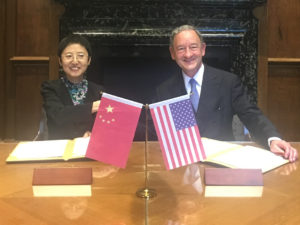A newly drafted partnership, signed last month in New York by Chancellor Mark S. Wrighton and officials with the China Scholarship Council (CSC), will bring up to 15 new PhD students per year from China to study at Washington University in St. Louis. The collaboration, which will last five years, represents a new and increased commitment level from the Chinese government to the university.

“This new partnership is an affirmation of Washington University’s commitment to global education and collaboration, building upon decades of international scholarly exchange and the strength of our McDonnell International Scholars Academy,” Wrighton said.
As part of the agreement, Washington University and the CSC will jointly sponsor the students on an equal basis, providing tuition support, a stipend and other benefits so they may pursue a PhD or another doctoral degree in St. Louis. Students will be accepted from any university in China, including McDonnell International Scholars Academy partners. A collaborative effort already is underway to encourage the country’s best students to apply.
Several Washington University leaders joined Wrighton in securing the new agreement with the CSC, including Shenyang Guo, assistant vice chancellor for international affairs for Greater China; Bill Xu, head of Washington University’s China office; and James Wertsch, vice chancellor for international affairs and director of the McDonnell International Scholars Academy.
“This new program will increase our already very successful effort to recruit the very top students from universities all across China,” Wertsch said. “It also increases the pool of Chinese universities with whom we can work to recruit and mentor their best graduates, and hopefully help them build their own institutions in the long run.”
The students will be known as CSC/WashU Fellows, and will be selected from a wide range of programs and disciplines. The first cohort will arrive in St. Louis in fall 2018.
“Overall, this is an important new chapter in our efforts to build long-term collaborative relationships with Chinese universities,” Wertsch said. “It promises to build even more research and teaching partnerships over the coming generations.”